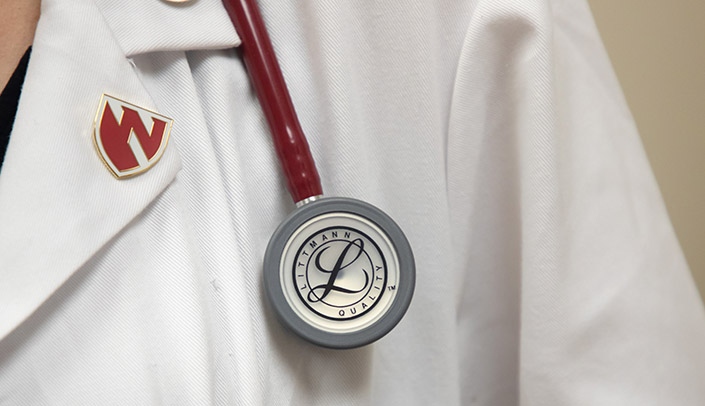The website for the Student Health Alliance Reaching Indigent Needy Groups (or SHARING) Clinics, says that due to the COVID-19 outbreak, clinics are closed. But they aren’t, really.
Instead, UNMC’s SHARING clinics, among the few in the nation run and staffed by students from every health-professions college, have gone to telehealth. The clinics, and UNMC students, still have been seeing patients since moving to telemedicine the second week of May.
Rather, they have been hearing them.
The health sciences students get together every Tuesday by Zoom, talk to preceptors, break into teams, go over cases, create plans and then call patients on the phone.
“It’s been a big effort that the students really led to continue to provide care for our patients during the pandemic,” said Kristen Cook, Pharm.D., who serves on SHARING’s faculty advisory committee board.
Wayne Mathews, faculty advisory committee chair, and William Hay, M.D., SHARING medical director, had brainstormed a secure and safe method for students to see patients.
Each interdisciplinary team — often consisting of medical and physician assistant students, pharmacy students, medical nutrition, psychiatry, and if video were available, physical therapy — is in its own Zoom “breakout” room to ensure patient privacy and HIPAA compliance.
“It’s working smoothly,” said Tess Lewis, a pharmacy student, who is SHARING co-president with fellow pharmacy student Quynh Tran.
“We started with four patients on that first clinic night. We’ve now bumped that up to six to eight, which is on par or even more than the number of patients we were seeing in the physical clinic,” Lewis said.
In fact, compliance has been even higher. Many SHARING patients face barriers to making it to appointments, such as lack of transportation. But, they can pick up a call.
“The thing that surprised me the most is how much we can do with patients over the phone,” Lewis said.
Through careful preparation — scripts, protocol, a pre-plan for each patient — and teamwork, each student has been able to help the patient through their own scope of practice.
“The most important thing for me was that we were still able to use the interdisciplinary team. That’s the best care we can provide for the patient,” Lewis said.
That includes mental health counseling and providing access to resources.
And as health care is set to move more and more toward an increased emphasis on telemedicine, this “hands-on” training will prove invaluable, Lewis and Mathews said.

Kudos to these hard working students on a valuable service to those in need!